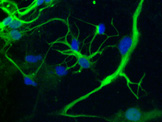 Human stem cells can be a renewable resource of replacement cells to treat alcohol related diseases. They can be derived from several sources, however the least controversial type are induced pluripotent stem cells (iPS cells) which are adult cells, typically blood or fibroblast, that are reprogrammed back to a pluripotent-like state. Human iPS cells have been used to establish several disease cell repositories because they possess all disease related genetic hallmarks, which includes mutations and aberration in gene expression (Alzheimer’s disease, Parkinson’s’ disease, etc). These iPS cells can be differentiated into multiple cell lineages (Neuronal, Mesenchymal, etc.). They can also be used to study the biologic mechanisms associated with alcohol abuse and alcoholism at various stages of development. Currently, these cells are underutilized tools for studying alcohol toxicity; utilizing iPS cells can lead to an improved understanding of alcohol related disease and conditions, better treatments with respect to the development of new drug treatment regiments, and educating alcohol abusers with respect to avoiding types of commercially available alcoholic beverages that they may be more susceptible to Addiction.
Human stem cells can be a renewable resource of replacement cells to treat alcohol related diseases. They can be derived from several sources, however the least controversial type are induced pluripotent stem cells (iPS cells) which are adult cells, typically blood or fibroblast, that are reprogrammed back to a pluripotent-like state. Human iPS cells have been used to establish several disease cell repositories because they possess all disease related genetic hallmarks, which includes mutations and aberration in gene expression (Alzheimer’s disease, Parkinson’s’ disease, etc). These iPS cells can be differentiated into multiple cell lineages (Neuronal, Mesenchymal, etc.). They can also be used to study the biologic mechanisms associated with alcohol abuse and alcoholism at various stages of development. Currently, these cells are underutilized tools for studying alcohol toxicity; utilizing iPS cells can lead to an improved understanding of alcohol related disease and conditions, better treatments with respect to the development of new drug treatment regiments, and educating alcohol abusers with respect to avoiding types of commercially available alcoholic beverages that they may be more susceptible to Addiction.
Previously, we established a stem cell repository, comprised of human pluripotent stem cells as well as patient derived iPS cells. We were the first to publish the use of human pluripotent stem cells (hPSC) as a model for alcohol toxicity in early human development. We found that exposure of undifferentiated hPSCs to low yet clinically relevant amounts of ethanol (20mM) leads to enhanced cell death, proliferation and changes in neuronal and glial cell differentiation patterns.
Through whole genome expression analysis, we discovered changes in the expression of over 500 genes a result of ethanol exposure, however 75 had direct contribution in the area of human development, neuronal and glial cell assembly, proliferation, differentiation, and cell death. Additionally, we have identified changes in the expression of GABA, NMDA, and CHRN receptors. These receptors are associated with drug Addiction and substance abuse, and have been shown to have different expression patterns in genetically diverse populations. We will expand our alcohol stem cell repository to include alcohol addicted/abusing patient derived-iPS cells with identified mutation and conduct validation comparisons to our existing alcohol treated hPSCs. This expansion will include iPS cells derived from a genetically diverse population that represents the drinking community in the United States, as alcohol metabolism and biological differences have been reported to differ based on genetic diversity. These cell will possess all of the disease hallmarks including genetic mutation, and the following are the expected benefits:
- The first and only patient derived-iPS cells for investigating the mechanisms that are involved in Alcohol Addiction, as well as the biology and signaling pathways that contribute to alcohol related disease. This will further alcohol research.
- Disease-specific cellular models for simple drug toxicology have been shown to reduce drug development cost and product time to market. There is no FDA regulation needed to use iPS cells.
- An in vitro, genetically diverse representation of the alcohol addicted/abusing community; for personalized drug treatment.
